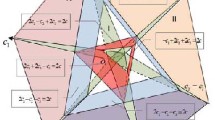Abstract
A three-person game with asymmetry of moves is constructed utilizing the interdependent theory and the concept of control studied by Kelly and Thibaut in order to conduct game theoretical analysis of coalition formation. This new game is an extended version of the three-person game introduced by Akiyama and Kaneko. We introduce asymmetry of moves into the original version, which modulates the self control, for considering a situation with different outcome through coalition formation by different strategies. We show that modulating the degree of self control in this game alters the social dilemma situations, namely, changes the blending of the individual rationality and the social rationality. Through the analysis of this game using an evolutionary simulation, we found that there is a possibility to realize a Pareto optimum with the maximum average payoff at a region of the self control parameter.
Similar content being viewed by others
References
Akiyama, E. and K. Kaneko (1995) “Evolution of cooperation, differentiation, and diversity in an iterated three-person game,” Artificial Life 2. 3: 293–304.
Kelley, H.H., J.G. Holmes, N.L. Kerr, H T. Reis, CE. Rusbult and P.A.M. Van Lange (2003) An Atlas of Interpersonal Situations, Cambridge University Press, Cambridge.
Kelly, H. H. and J. W. Thibaut (1978) Interpersonal Relations: A Theory of Interdependence, John Wiley & Sons, New York.
Kosugi, K. (2006) “Theoretical consideration of three-person game (1): Decomposition of influence using Kelley’ s interdependent theory” (in Japanese), in The Proceedings of the 47th Meeting of the Japanese Society for Social Psychology, pp. 522–523.
Suzuki, M. (2005) “A Game-Theoretic Analysis of Compliance Problems for International Agreements: A Case of Arms Control Agreements in a Pluralistic World” (in Japanese), in H. Imai and A. Okada (eds). Applications of Game Theory, Keisho-Shobo, Tokyo, pp. 241–265.
Author information
Authors and Affiliations
Corresponding author
About this article
Cite this article
Hashimoto, T., Uehara, Y. Coalition and Dilemma in a Three-person Game. Evolut Inst Econ Rev 6, 185–200 (2010). https://doi.org/10.14441/eier.6.185
Published:
Issue Date:
DOI: https://doi.org/10.14441/eier.6.185




